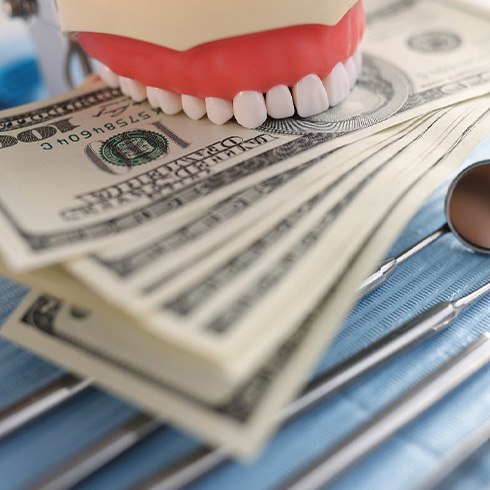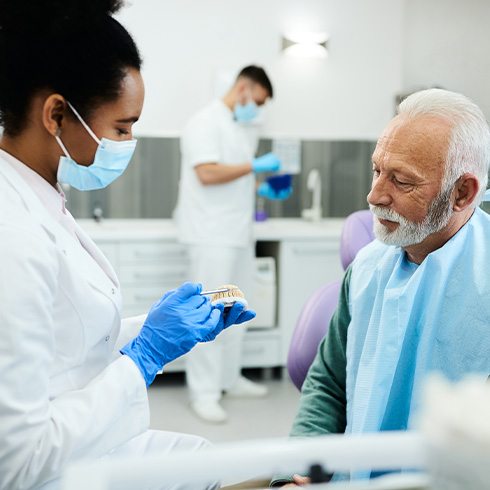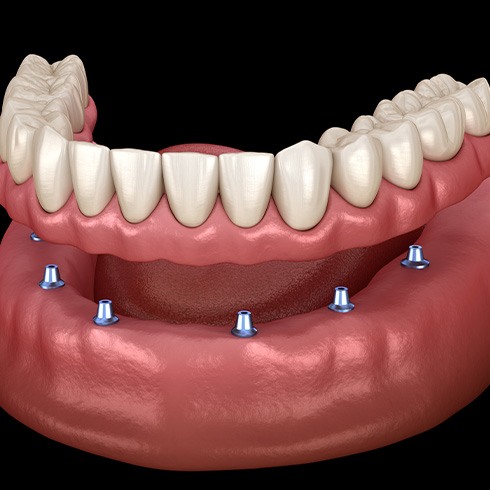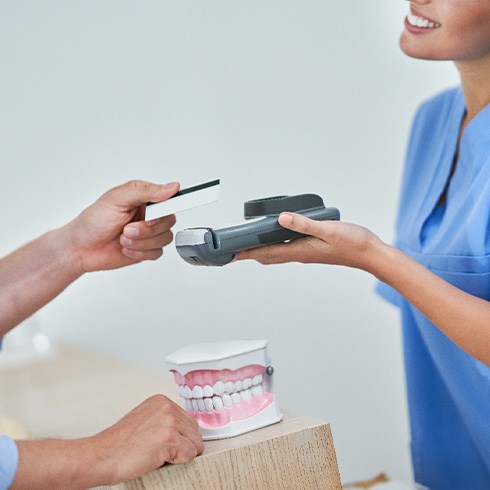Dentures – Jersey City, NJ
An Affordable Way to Replace All Your Teeth
Living with the inconveniences of an incomplete smile can be trying. You might find it difficult to eat a wide variety of foods, or perhaps you find it embarrassing to smile in public. If your natural teeth need replacing, we can create dentures that you can feel confident about. Our dental office offers the type of dentures for our Jersey City, NJ dental patients that are a good fit for each unique individual. To learn more about this affordable way to replace all your teeth, read on below or give us a call today.
Why Choose AV Dental Associates of Jersey City for Dentures?
- In-House Implant Placement Available
- Knowledgeable and Friendly Dental Team
- Long-Lasting, Lifelike Materials
Who’s a Good Candidate for Dentures?

Nearly anyone can get dentures, whether you’re missing a few teeth or many. These restorations don’t have strict requirements to meet. Having said that, you should consult our dentists before treatment. They can confirm whether your smile qualifies for dentures. Our team can also help even if you don’t qualify. In that case, we may suggest some preliminary dental work. We could also show you our office’s other restorations. If you want to learn more, please keep reading or call us soon.
Effects of Missing Teeth

When considering dentures, you should review tooth loss’ causes and effects. This step reinforces how treatment can aid your smile.
In general, tooth loss causes tend to be wide-ranging. One person’s teeth may fall out due to severe decay. Meanwhile, a different figure could have gum disease that deprives a tooth of support. There’s also the chance that someone has an accident or injury that knocks out their teeth.
Whatever its causes, the effects of tooth loss are quite severe. The most notable one is how missing teeth makes everyday life harder. This condition also creates smile gaps that slowly erode your jaw. If left unchecked, the erosion process could result in facial collapse. Worse yet, it can tilt your remaining teeth until they fall out.
What Qualifies You for Dentures?

Patients only need to suffer tooth loss to qualify for dentures. These devices don’t have other big conditions on their use. However, it’s still useful to keep certain facts in mind.
The first one is that oral health affects how and whether dentures work. If your gums and jaw are too weak, they won’t be able to support the restorations; dentures wouldn’t benefit you in that case. Luckily, minor oral issues are a different story. Dentures can easily replace any sensitive or decayed teeth you may have.
You should also note how many teeth you need to replace. Depending on the final number, we’ll recommend one of two possible dentures. The first kind is a partial model that only replaces a few teeth. In contrast, the second is a full denture that replaces all teeth along an arch.
Finances play a role in whether you get dentures as well. As it turns out, these restorations are the least pricey tooth replacements. They especially suit patients who need an inexpensive option.
Alternative Tooth-Replacement Options

If you don’t qualify for dentures, you don’t need to worry about it. Our practice has two other treatments that can restore your smile. If you’d like, we’ll gladly share them with you. They are:
- Dental Bridges – A dental bridge is a fixed restoration made of two crowns fused to a pontic (i.e., an artificial tooth). By securing itself to certain nearby teeth (i.e., abutments), it can fill large smile gaps and stay fairly secure. Still, placing it requires that we remove some enamel from the abutments.
- Dental Implants – Dental implants are small titanium posts that act as your tooth roots. Once placed in your jaw, they slowly fuse with surrounding bone tissue and become permanent. They’re also capped with porcelain, so they’ll also blend seamlessly with your smile. However, dental implants can be costly; their unique traits raise prices.
Learn More About Dental Bridges
Learn More About Dental Implants
How Dentures are Made

If you’re considering dentures, you may want to know how they’re made. That’s only fair – grasping what went into your new teeth can help you value them. However, facts on the denture creation process aren’t always easy to come by. We at AV Dental Associates understand, so below is a summary of how dental labs make dentures. Please read it to learn how these restorations come to be, or call our office for the details.
What are Dentures Made Of?

While a single device, a denture – no matter the type – has multiple parts. These components are the base and the artificial teeth, which act together to form the appliance. Consider their features as described:
- Denture Base – The foundation that supports a denture’s artificial teeth. It’s usually made of acrylic, reason, nylon, or metal, depending on the situation. Acrylic material is often used for full denture bases, while it and nylon are included in partial dentures.
- Artificial Teeth – The tooth-replacing portions of a denture, often crafted from enamel-colored resin or porcelain. Porcelain tends to be the more popular material due to its realistic looks.
The Denture Creation Process

Rather than take a generic approach, dentists customize each denture for a unique patient’s mouth and bite. They thus follow a strict and multi-step process to make one. These measures include:
- Step 1: Our dentists will take a dental impression of your mouth. From there, they’ll make a plaster model that matches your future denture’s size and shape.
- Step 2: We’ll send the plaster model to a lab, whose workers will use it to create a wax gumline.
- Step 3: After making the wax gumline, lab workers will set artificial teeth in it. This step leads to a prototype denture used to make the final one.
- Step 4: Our office will receive the prototype denture and see if it fits you. After testing, we’ll then send it back to the dental lab that crafts the restorations.
- Step 5: After boiling the denture to remove its wax, a worker will place it in a flask. This flask will receive plaster and sit in hot water.
- Step 6: A separator will go into the plaster layer, keeping the acrylic from sticking. This latter material will be injected into the flask to replace the wax.
- Step 7: The lab worker will remove all plaster to reveal the denture. Later, they’ll place the restoration in a bath to remove residue.
- Step 8: The worker will cut off the denture’s excess acrylic, followed by briefly polishing it.
- Step 9: You will have your final denture fitted. At that time, the dentist will adjust it to work smoothly.
Adjusting to Your New Dentures

It’s common for the mouth to ache a bit when you first use dentures. Initially, the new teeth may even feel sore and cause struggles with eating or speaking. That said, these restorations should be more familiar to you over time; they’ll soon feel like your other teeth.
Of course, it’s possible to speed up the adjustment process. You could exercise your facial muscles to strengthen them, eat soft foods to avoid pain, etc. Through these options, you’d make great use of your dentures even sooner. Still, you’d need to take some time, no matter what.
Please call our office if your aches persist or worsen. In those scenarios, your dentures may need adjusting.
Types of Dentures

During your consultation with our team, we will carefully examine your mouth before we make a recommendation about which type of denture we believe would best fit your needs. Depending on the circumstances, we might determine that you are an ideal candidate for one of the following:
Partial Dentures

Partial dentures fit in like a puzzle piece, working around the natural teeth so you can keep as much of your existing smile as possible. They are typically made out of acrylic, and they may have acrylic or metal clasps to help them remain secure in your mouth.
Full Dentures

As their name implies, full dentures replace an entire arch of missing teeth. They are usually held in place via natural suction, sometimes with the help of adhesive. Their custom fit helps them to stay secure and comfortable during use. In most cases, their base is made out of acrylic while the teeth are constructed out of acrylic or porcelain.
Implant Dentures

Implant dentures are held in place via prosthetic tooth roots, called dental implants, which get inserted into the jawbone during a minimally invasive surgery. This is the most sturdy and reliable form of denture. It also has the longest life expectancy. However, its price can be significantly higher than that of a conventional denture.
Benefits of Dentures

Dentures offer a number of outstanding benefits that make them a top option for patients missing several or all of their teeth along an arch. In addition to being custom-crafted to look lifelike, they can improve several parts of your life, ranging from your professional and personal relationships to your mental health and wellness. Read more about the variety of benefits you can enjoy with dentures below.
Psychological Benefits

Studies show that about 58 percent of people that experienced tooth loss had difficulties accepting it. As a result, the participants reported that they restricted their social activities due to functional limitations. They also found that people with missing teeth were more likely to experience emotional consequences, like sadness, anxiety, and depression. When you invest in dentures, especially implant dentures, you may find that your emotional wellbeing improves drastically as a result of having a full and functional smile once again.
Better Enunciation

At first, you may notice that speaking with your dentures can cause clicking sounds. However, this is a natural part of the adjustment period and a common challenge that can be easily overcome by practicing speaking and reading aloud to yourself. Once your facial muscles build up and your dentures are more stable, you will likely find that you’re able to speak with greater ease.
Improved Nutrition

After going through your adjustment period, you may find that you’re able to eat a greater variety of foods after getting dentures, like chewy proteins. However, it’s important to have realistic expectations and understand that even with well-fitting dentures, you may need to steer clear of foods that are excessively sticky, chewy, and hard.
As a result of being able to eat more foods, you’ll be providing your body with much-needed nutrients that you may not have been able to easily get with gaps in your smile.
Preservation of Oral Health

Tooth loss has been shown to impact oral health in addition to overall quality of life. When you leave gaps in your smile, you can experience shifting of your other teeth, bacteria and food debris accumulation, and an increased risk of gum disease and bone and tissue loss. By replacing your missing teeth and restoring your smile, you can help minimize your risk of developing additional dental concerns, including worsening tooth loss.
Boosted Confidence

One of the greatest benefits of dentures in Jersey City is the fact that you’ll be able to let yourself unabashedly smile once more. Whether you find yourself in a career-defining job interview, on an important first date, or just out with friends and family, you deserve to let your smile shine. With dentures, whether they’re full, partial, or implant dentures, you can do that with pride.
Understanding the Cost of Dentures

As you look into dentures, you should take the time to learn their price. Doing so will ensure your final treatment – whatever it is – effectively fits your budget. That said, the cost of dentures varies by patient; you’ll need to consult us to get a final estimate. We can then find ways to make your care affordable, all while outlining its pricing factors, the role of dental insurance, etc. For further details, please keep reading or call soon.
Factors That Affect the Cost of Dentures

You’ll receive an oral exam when you arrive for your consultation. Through this assessment, our dentists will assess several factors that affect your dentures’ cost:
- Preparatory Care – If your mouth has issues besides tooth loss, you may need preparatory procedures (gum diseases therapy, tooth extraction, etc.) before you can get dentures. These services would increase your final treatment cost.
- Type of Acrylic – Depending on your needs, your denture’s base may use one kind of acrylic or another. Which type it contains will make your care more or less expensive.
- Type of Artificial Teeth – Often enough, a denture’s artificial teeth are made of acrylic or porcelain. Acrylic ones are cheaper, while porcelain kinds can get costly.
Beyond these points, remember: cheap dentures use poor materials. You’ll want to get moderately-priced ones to ensure your restoration is well-made.
Are Implant Dentures More Expensive?

Though their upfront price is higher, implant dentures are worthwhile. They offer many great perks that a “traditional” denture simply can’t.
You see, implant dentures are secured with dental implants. These metal posts actually fuse with your jaw, ensuring your whole appliance remains stable and secure. They’re even capped with tooth-colored porcelain, so they’ll make your restored smile look incredibly lifelike.
Today’s implant dentures are also great financial investments. Because they can last for 30 years or more (with proper care), they don’t often need repair or replacement work. These devices will save you money otherwise spent on other restorations (and their maintenance).
Does Dental Insurance Cover Dentures?

In most cases, dental insurance will cover a patient’s dentures. The average plan views the prosthetics as medically necessary and covers about 50% of their cost. Due to these realities, your benefits will likely if you’ve met your deductible.
The bad news is that exceptions to the above exist. Indeed, your policy may have limited coverage, no coverage at all, or similar rules. You should thus confirm your benefits before you commit to anything. If you’d like, our dental team will even help you do so.
Other Options for Making Dentures Affordable

Of course, dental insurance isn’t the only way to make dentures affordable. Others like our helpful payment options also exist, such as:
- AV Dental Discount Plan – By paying $385 a year, you can join our office’s AV Dental Discount plan. This service would give you (among other things) a 20% discount on our dentures.
- Flexible Financing – AV Dental Associates is proud to work with CareCredit, a reputable 3rd party financier. They let patients pay for treatment in manageable monthly installments, with little to no interest involved.
To enjoy quality dentures, you don’t need to “break the bank.” Just visit us instead; we’ll ensure your restorations fit your mouth and your budget!
Dentures FAQs
Can I sleep with my dentures?
For the first 24 hours, plan to wear your dentures even while you sleep. After the first day, you will need to remove your teeth before going to bed. Here’s why:
- Your gums and jawbone need time to rest. They support your dentures all day and miss out on vital nutrients. Nighttime allows these areas to recover and provide greater support the following day.
- It slows down bone resorption. Dentures do not stimulate the underlying bone, so continuing to wear them even at night will make your bone weaken faster, which will ultimately change the shape of your dentures, requiring you to receive a reline.
- Wearing dentures at night increases your risk of pneumonia. Bacteria thrive in dark, damp places, so keeping them in your mouth makes it easy for harmful particles to develop between your dentures and gums.
While you’re sleeping, let your dentures soak in an overnight cleanser. This helps remove any additional bacteria and food particles that were collected throughout the day.
What should you not eat with dentures?
While dentures make it easier to eat certain foods, there are some that you need to avoid if you want to prevent damage or slippage. These include:
- Sticky foods, like caramels, peanut butter, and gummy candy
- Tough or chewy meats, like roast, prime rib, pork chops, etc.
- Nuts, popcorn, or anything else with seeds
- Raw vegetables and fruit
- Corn on the cob
You may find it more challenging to eat these food items, as they can cause your teeth to slip or accidentally fall out. It’s also possible that you may damage your dentures by biting down on something that can cause a crack to form.
Is it hard to talk with dentures?
Do not be surprised if you experience some difficulty talking with your dentures initially. When you receive your first set or have a new prosthetic crafted, you may develop a temporary lisp that makes it harder to form certain sounds and words. While this should not last more than a few weeks, you can quicken the process by practicing your speech at home. For example, you can read aloud, practice certain hard-to-say words or sounds, and speak slowly. Over time, you will notice the lisp fading as your mouth becomes accustomed to your new teeth.
How long will you have to wait to get dentures after your teeth are pulled?
If you need to have one or more teeth removed before receiving dentures near Jersey City, you will require sufficient time to recover. This means you can expect the average timeframe to be 6-8 weeks before you can begin the next phase of treatment. Much of this depends on how well you take care of your mouth and what type of denture you choose – full, partial, or implant denture. If you choose to receive one that is held in place by dental implants, you should expect an additional six months of recovery after your implant posts are put in place before receiving your final set of dentures.







